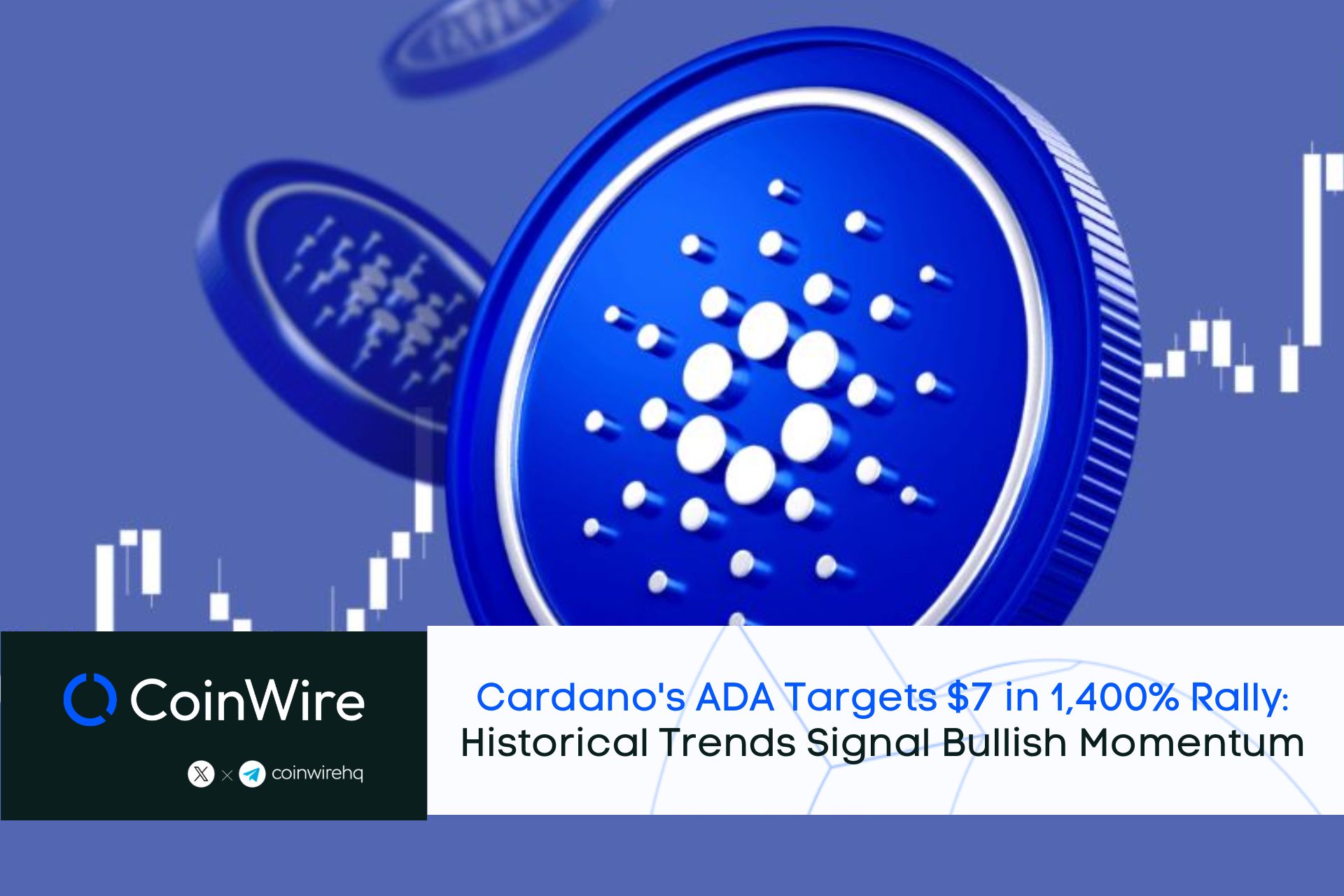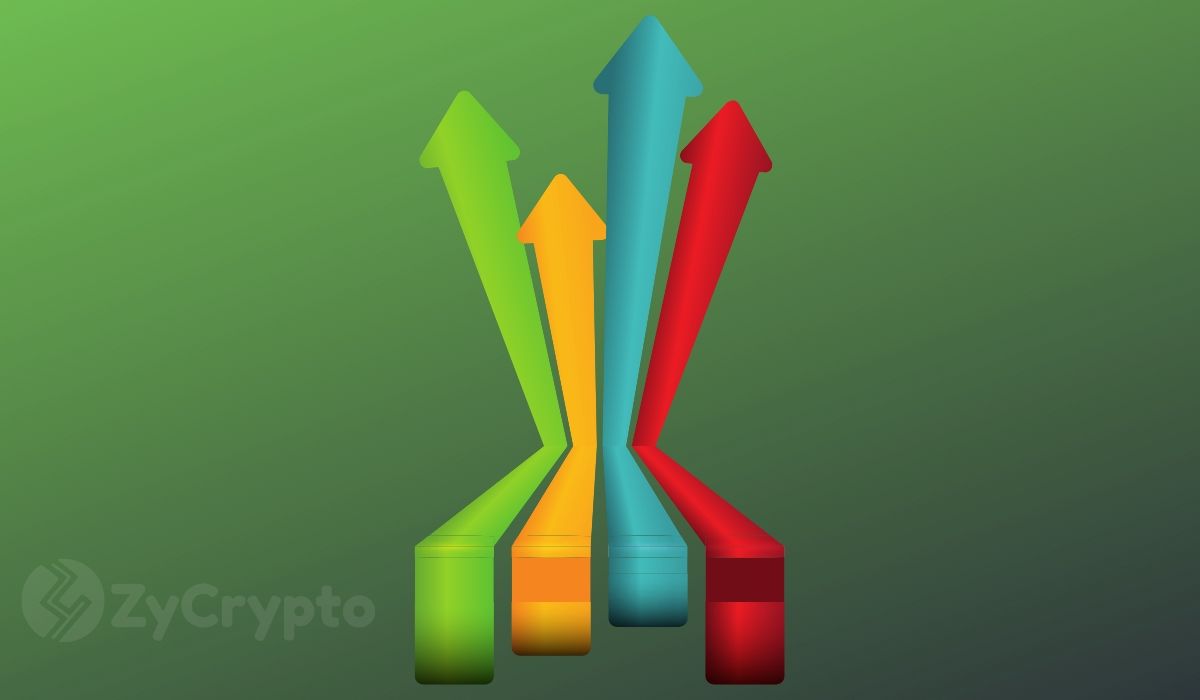Best Cardano Wallet: Where to Store Your ADA
Cardano is a well-known and popular coin. As a matter of fact, this coin ranks #8 in total market capitalization. Despite its popularity and cheap transaction costs, many still undervalue […]
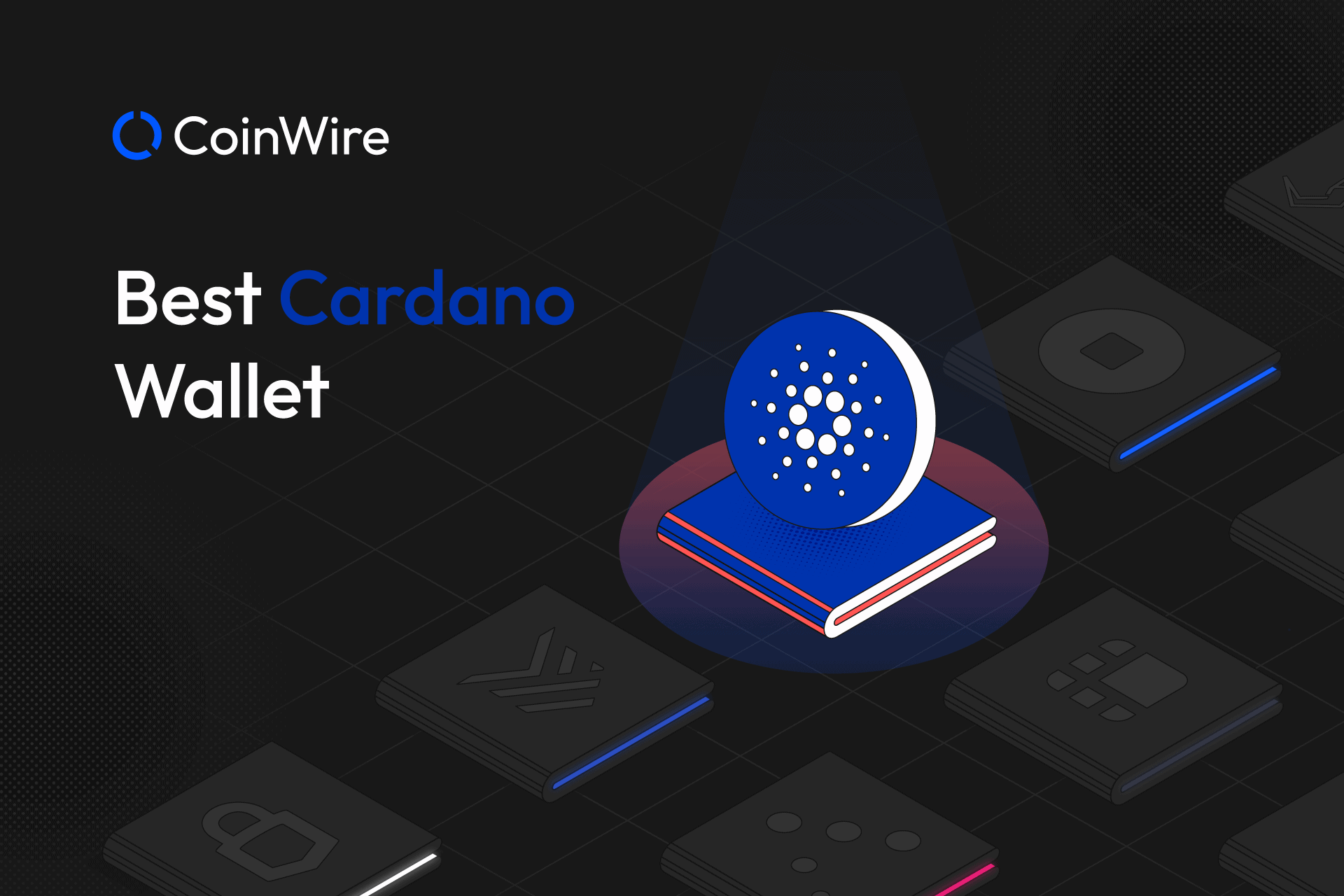
Cardano is a well-known and popular coin. As a matter of fact, this coin ranks #8 in total market capitalization. Despite its popularity and cheap transaction costs, many still undervalue ADA and its potential. If you’re looking for a place to store your Cardano, there are plenty of options available, which means you can choose the wallet that makes the most sense for you.
There are hardware, software, and web wallets, so you can select the appropriate option. With that in mind, let’s take a look at what a Cardano wallet is.
- Daedalus – Best Cardano desktop wallet
- Yoroi – Best Cardano web wallet
- ADALite – Best lightweight Cardano wallet
- Ledger Nano – Best Cardano hardware wallet
- Coinbase Wallet – Best Cardano wallet for newbies
- Trezor – Best wallet for security
- Exodus – Best multicurrency wallet
What is a Cardano Wallet?
When we talk about a Cardano wallet, we’re referring to hardware or software specifically created to hold, send, or receive Cardano, known by its symbol, ADA. A cryptocurrency wallet is like a bank. A good crypto wallet lets investors and traders withdraw, deposit, or move their funds whenever they want.
However, for it to be an ADA wallet, it must work with the Cardano blockchain. So be sure the wallet is compatible before sending your digital assets. As we said, there are plenty of wallets on the market, all of which offer a variety of features, functionality, convenience, and security. But before we start talking about specific Cardano wallets, let’s take a look at the types of wallets on the market.
Cardano Wallet Types
There are many different types of Cardano wallets, all of which have their own advantages and disadvantages. To understand their differences and choose the best one, you need to know what each wallet type has to offer. Let’s talk about some of the ways you can differentiate between Cardano wallets.
Custodial vs. non-custodial
Your private and public keys are important for any digital wallet. These are important as they allow you access to send and receive funds to and from your wallet. A non-custodial wallet is a wallet that gives the owner complete control of the wallet. No one else can use it unless they have the keys.
If you’re a beginner to cryptocurrency, you might want to hold off on using a non-custodial wallet since they require a little more understanding of blockchain and how it works. The primary point of failure with a non-custodial wallet is that if you lose your keys, you’ll lose your funds as well.
By comparison, a custodial wallet means that the company that provides the wallet controls the keys for the owner. For example, if you use Coinbase to store your Cardano, they are in charge of the keys.
The problem with custodial wallets is that they’re often not as secure as their non-custodial counterparts. However, for beginners, they’re excellent options as it provides one less thing that needs to be tracked. Additionally, if the platform holding the funds is no longer available, or if the investor can’t access their private keys, recovering funds can be a challenging and difficult undertaking.
Paper wallets
Just as their name would suggest, a paper wallet is a printed piece of paper with your wallet information on it. We all know you can’t actually print out your wallet, which is why a paper wallet has your keys printed right on it. A paper wallet will contain both your private and public keys, so you need to be sure you store it in a secure place.
For example, you’ll want to make sure the paper stays dry and isn’t in direct sunlight. Of course, paper wallets lost some of their cache with the rise of hardware wallets, but they’re still a viable option if you want a wallet that doesn’t have access to the internet, which keeps your funds secure.
Hardware wallets
If you’re concerned about security, but you don’t want to deal with a paper wallet, then you can always consider a hardware wallet that will hold your ADA. Outside of paper wallets, hardware wallets are the best security option on the market. Of course, hardware wallets are actual physical devices, so you’ll have to spend a little money to get one.
The vast majority of hardware wallets include an app that’s available to download on multiple operating systems, like Windows or Mac OS. You can use this app to view your Cardano when you plug it into your laptop or desktop computer. While plugging in a hardware device isn’t as convenient as launching an app on your laptop or mobile device, it’s a much more secure way to buy and sell digital assets.
Software wallets
Chances are good that if you’re already using a wallet to hold your Cardano, it’s a software wallet. This is the most common type of wallet and includes two of the most popular wallets available for holding your Cardano. If you downloaded the wallet from a website, then you’re using a software wallet.
However, there are different types of software wallets, and each type has its own distinct features:
- Desktop wallet – With a desktop wallet, you’ll download a program to your desktop or laptop and install it. These are great for securing your Cardano on your computer rather than using your mobile device.
- Mobile wallet – There are also wallets that you can download and install on your smartphone. These are mobile wallets, which are great if you need to check your funds while you’re away from your computer. Some desktop wallets have mobile wallets apps, so you can sync your Cardano between the two.
- Exchange wallet – The third type of software wallet is an exchange wallet. There are both mobile and desktop wallets available through many exchange wallets. Coinbase, for example, has a mobile wallet that allows you to check your funds while you’re on the go. Exchange wallets are great for those who want to quickly and easily access their funds while buying, selling, or trading.
What to Look for in a Cardano Wallet
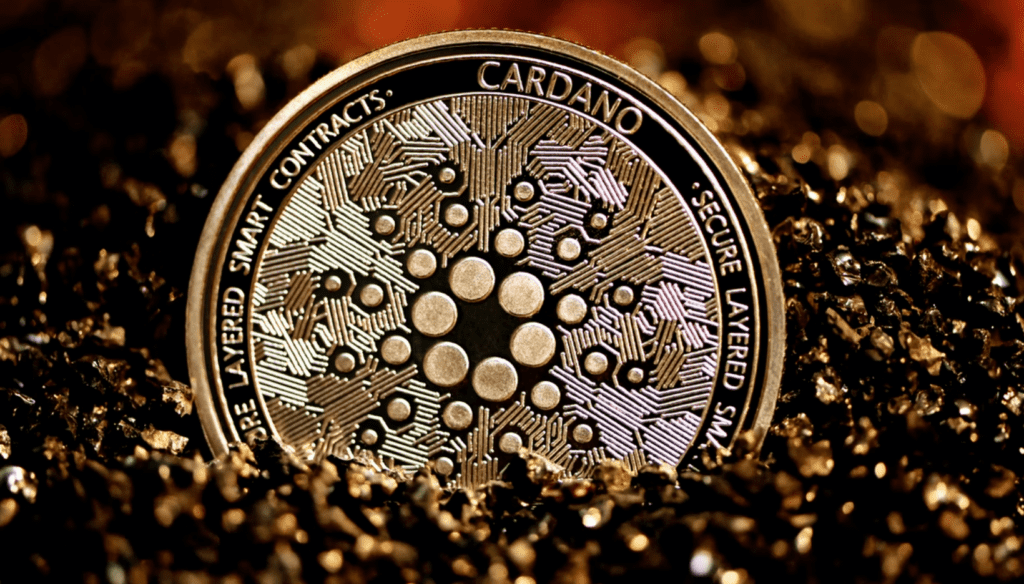
As you consider which wallet is the best Cardano wallet, you might want to give some items consideration. Here are a few things to look for as you pick the wallet that makes the most sense for you and your ADA.
Supported cryptocurrencies
While there are some Cardano wallets that only support ADA, like Daedalus, there are also mobile and desktop wallets that support a wide range of digital assets. Of course, these wallets make it easier if you want to hold a variety of cryptocurrencies. Before you make a final decision on the wallet you want to use for your Cardano, make sure it supports the right crypto.
Security
The purpose of your Cardano wallet should be to keep your ADA safe and secure. That means you’ll want a crypto wallet that’s known for providing excellent protection. Non-custodial wallets and hardware wallets are the most secure wallets on the market. However, you might want the convenience of an exchange wallet. Since they’re not as secure as hardware wallets, you should look for options that include additional securing features, like two-factor authentication.
User experience
Do you really want to use a Cardano wallet if the user experience is unpleasant, complicated, or complex? Unless you’re buying, selling, and trading crypto all day, you want a wallet that makes things simple and easy, with an excellent user design and interface.
Transaction fees
You’re not likely to see many fees no matter what type of wallet you choose for your Cardano. However, there are some wallets that charge a network fee when performing a transaction. Others charge a “wallet” fee, but these types of wallets are few and far between. If you do find one that’s charging you high fees, it’s probably time to look for another place to keep your ADA.
Best Cardano Wallets
Now, the information you’ve been waiting for. Here’s our list of the best Cardano wallets.
Daedalus
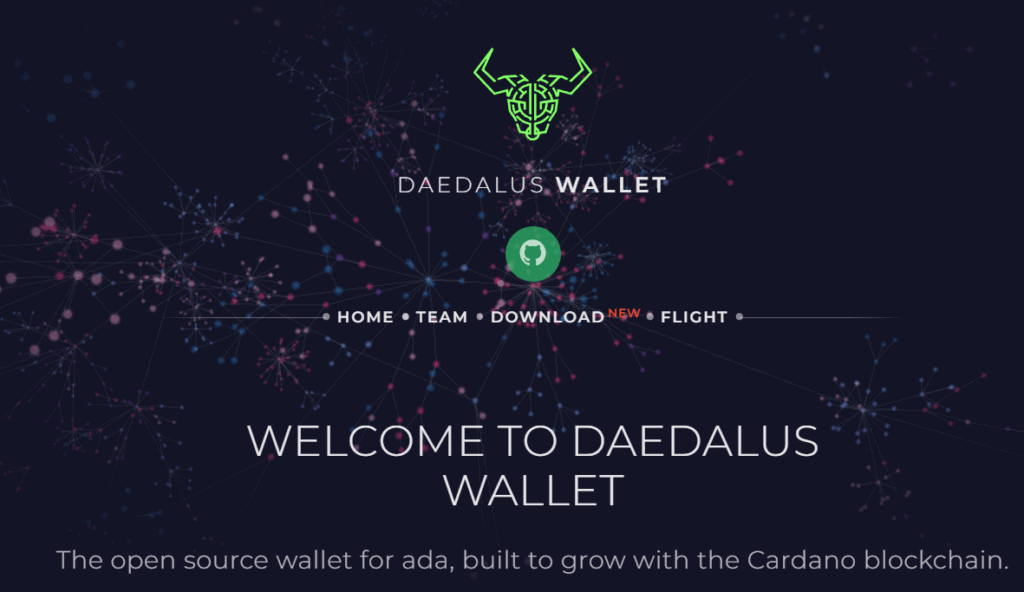
Up first on our list of best Cardano wallets is Daedalus. This desktop wallet is a full-node wallet, which means that you’ll download the entire Cardano blockchain to your computer when using it. Daedalus was developed by Cardano’s founders which launched in 2015. Since it became available, Daedalus has quickly become arguably the most popular Cardano wallet on the market.
The thing to note about Daedalus is that it does not offer the option to buy or sell ADA. It only supports Cardano, so if you want a wallet that supports multiple cryptocurrencies, you’ll need to look for another option. Regardless, Daedalus is an excellent option for active traders and experienced investors as it’s a non-custodial wallet.
Additionally, Cardano is open-source, which means that if you want to view the source code for Daedalus, you can do so at any time. Many investors prefer this type of wallet since it allows them to see that nothing fishy is going on. It’s a great choice for anyone who wants to hold ADA while protecting their privacy.
The drawback is that Daedalus does not offer a mobile app, so if you want to move your Cardano while you’re away from your computer, you won’t be able to do so.
Pros
- Non-custodial wallet
- Developed and launched by Cardano founders
- Free to use
- Stake ADA in the wallet
- Easy to use
Cons
- Only supports Cardano
- No mobile app is available
Yoroi

Another non-custodial Cardano wallet, Yoroi, launched in 2018 as a web-based ADA wallet. While storing Cardano in Yoroi, your funds will be secure and private. Yoroi is similar to Daedalus in many ways, one of which is that they are both anonymous wallets focused on ADA. Additionally, both wallets were developed and launched by the founders of Cardano.
Of course, there are differences between the two as well. Where Daedalus is a full-node wallet and downloads the entire Cardano blockchain, Yoroi only pulls the information that it needs to perform and record a transaction on the Cardano ledger. However, like Daedalus, there is no way to buy or sell Cardano on the app itself, so you’ll have to move your funds to an exchange to facilitate that type of transaction.
Unlike Daedalus, there is a Yoroi mobile app, so you can use the wallet when you’re on the go. Additionally, Yoroi is compatible with hardware wallets like Trezor or Ledger, so you know your funds will be safe and secure anytime you need them. If you’re looking for a lite Cardano wallet that’s easy to use and secure, Yoroi is a solid option.
Pros
- Mobile app available
- Developed by Cardano founders
- Lightweight
- Easy to use
- Compatible with hardware wallets
Cons
- No built-in exchange included
- Only supports Cardano
- Doesn’t download entire node
ADALite

The third Cardano wallet on our list is ADALite. This is an interesting wallet when compared with Daedalus and Yoroi because it doesn’t offer quite as much functionality as the other two. However, it is lightweight, secure, and easy to use, so if you’re just getting started with crypto, it’s not a bad option.
Just like Yoroi and Daedalus, you can’t buy or sell Cardano through the wallet. That means if you want to add more ADA to your portfolio, you’ll have to go to an exchange like Binance, Kraken, or Coinbase and buy more, then send it to your wallet. However, what it lacks in features and functionality, ADALite makes up for in security.
For example, the wallet requires that all users make note of a passphrase and use it to secure their ADA. If you’re not familiar with it, a passphrase is a secure, 12-24 word mnemonic, so you’ll need to keep track of it if you want to access your ADA. As a result, ADALite is an excellent wallet option for those who prefer to focus on security.
ADALite is a simple and easy-to-use wallet that’s not going to give you a lot in the way of extra features and options. It’s a no-frills, simple, and basic wallet. However, if you want to stake your ADA, you can do so through ADALite, so you can earn some interest on your Cardano.
Pros
- Stake ADA right in the wallet
- Compatible with hardware wallets
- Easy to use
- Plenty of security features
Cons
- Not many features
- Desktop-only wallet
- Only supports Cardano
- Can’t buy or sell through the wallet
Ledger Nano X hardware wallet

If you’re interested in a hardware wallet, you might take a look at the Ledger Nano X. It’s a very well-known hardware wallet that focuses on security and safety. For those who value protection above all else, this is the ADA wallet for you.
You can store all your digital assets, including Cardano, on the Ledger Nano X. It’s kept offline unless you’ve plugged the hardware into your computer. Plus, you have to use a passcode to access your funds, buy, sell, or transfer your ADA. This makes it very difficult for anyone who isn’t you to access your funds.
Many of the Cardano wallets on this list are free to download and use. Unfortunately, that’s not the case for the Ledger Nano X. You’ll have to pay for the hardware, so be prepared to shell out if you decide to store your ADA on it.
While the initial cost of a hardware wallet might be high, it’s an excellent investment for those who prioritize safety over anything else. Plus, Ledger hardware wallets support a wide variety of cryptocurrencies, and they come with a built-in exchange, so you can buy, sell, and trade your ADA anytime you want.
Pros
- Built-in exchange
- Focuses on security
- Supports a variety of cryptocurrencies
- Some Ledgers offer Bluetooth capability
- Multiple hardware options
Cons
- Can be costly
- Limited storage for cryptocurrencies
- Not very mobile friendly
Coinbase
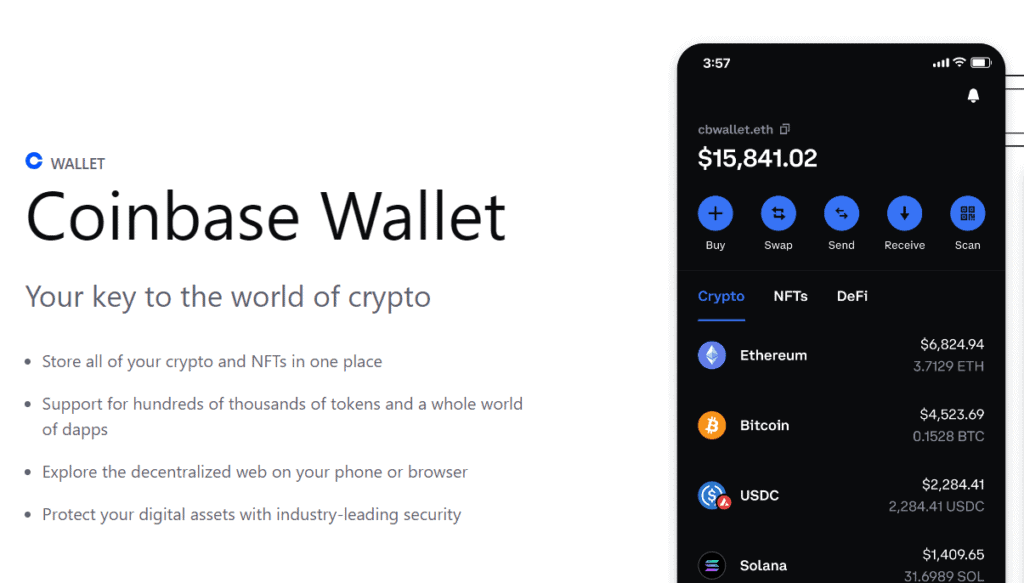
One of the most popular and well-known crypto exchanges in the world is Coinbase. The platform boasts more than 100 million users from all across the globe. Even though it’s known for being an excellent place for new crypto users to get started, Coinbase still offers plenty of features that experienced traders and investors will appreciate.
For example, Coinbase takes its security very seriously. If it didn’t, it wouldn’t hang on to its users for very long. The exchange keeps the majority of its funds in an offline, cold wallet, which means your ADA is safe and secure. It also follows the latest security features, which include two-factor authentication, so you have to take the extra step to access your account.
Additionally, every project listed on Coinbase – including ADA – had to undergo a rigorous validation process, which ensures that all coins listed are legitimate. Unfortunately, Coinbase is also known for having higher fees than other exchanges. For example, when you use your credit or debit card to deposit funds into your account, Coinbase charges you 3.99%. This is significantly more than you’ll be charged with other exchanges.
Coinbase takes a lot of flak for its fees, but it also offers plenty of other features. Users have access to both non-custodial and custodial wallets through the exchange, which is an excellent way for more experienced traders to split their assets. Overall, Coinbase is a great place to store your ADA if you’re just getting started in the world of cryptocurrencies.
Pros
- Custodial and non-custodial wallets
- Supports a variety of cryptocurrencies
- All currencies listed go through validation
- Easy to use
- Great for beginners
Cons
- Charges more than other exchanges
- Doesn’t offer advanced trading tools
- Fewer staking options
Trezor
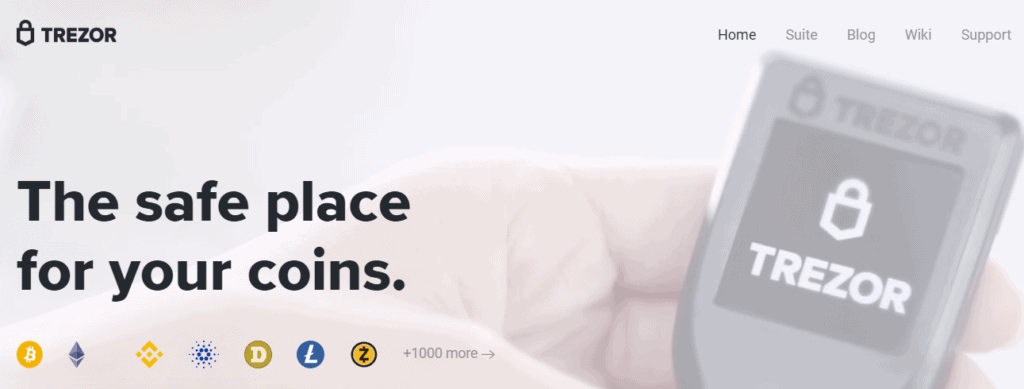
The second hardware wallet on our list of best Cardano wallets, Trezor wallet, is a solid option if you don’t like what the Ledger wallets have to offer. However, one thing to keep in mind is that both hardware wallets follow similar principles when it comes to security. Like its Ledger counterpart, Trezor hardware encrypts all of its private keys.
Trezor’s hardware wallet offers all the security features you would expect. You’ll get state-of-the-art functionalities, including leading-edge cryptography, which means your funds are kept safe and secure. Additionally, you’ll have access to the wallet’s password manager, which is available to remove the confusion of remembering long, complex passwords.
Unfortunately, you’ll have to pay for your Trezor hardware wallet, which is considered a more premium device than its Ledger counterpart. You’ll shell out a few hundred dollars for the top-of-the-line Trezor hardware wallet.
Overall, whether you choose Ledger or Trezor is really a matter of personal choice. Both offer the same protection and security for your Cardano, so visit both sites before you make your final decision.
Pros
- Supports a variety of cryptocurrencies
- Very secure
- Includes a password manager
- Compact and easy to use
Cons
- More expensive than Ledger devices
- Not many accessories
- Design could use improvement
Exodus
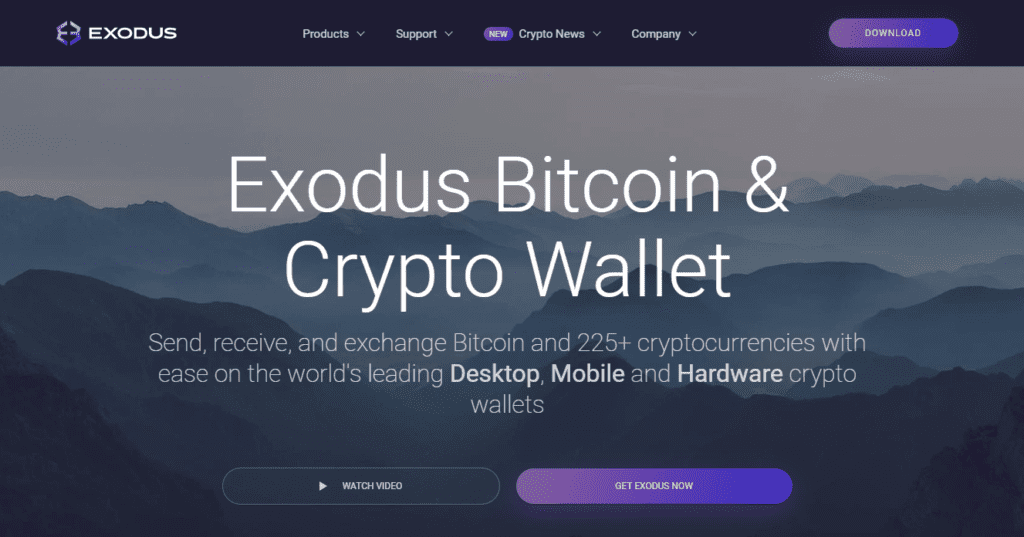
One of the best non-custodial wallets on the market is Exodus, which is available in a variety of types, including desktop and mobile. Since it’s non-custodial, you’ll have complete control over all your funds whenever you need to move them. Of course, you should note that with non-custodial wallets, you’ll probably pay a little more in transaction fees.
You’ll have access to a wide variety of features with the Exodus wallet, which includes staking your favorite digital assets and lending cryptocurrencies, which provides you with a way to earn passive income on your Cardano.
If you’re worried about security, Exodus is among the best. Plus, since the wallet doesn’t have control over your crypto assets, it’s plenty safe to use. Unfortunately, Exodus does not include two-factor authentication, but you can secure your wallet with a hardware wallet like Trezor or Ledger.
Additionally, Exodus includes a built-in exchange, so if you want to trade for more ADA, you can do so right there in the wallet. Plus, Exodus supports a wide range of cryptocurrencies, so if you need to store more than one type of digital asset, you can do so.
Pros
- Supports many cryptocurrencies
- Compatible with hardware wallets
- Adjustable fees
- Easy-to-use interface
- Built-in exchange
Cons
- No crypto-to-fiat capabilities
- Could use more security
- No multi-sig or two-factor authentication support
FAQs
Here are some commonly asked questions about the best Cardano wallets on the market.
Which Cardano wallets can be used for Cardano staking?
There are several wallets that allow you to stake your Cardano. Some of the more popular options include:
- Daedalus
- Yoroi
- Exodus
- Binance
Is Cardano a good coin to invest in?
Even though Cardano has seen a significant drop – like many other cryptocurrencies – there are plenty of analysts who suggest that ADA could show significant returns over the long haul. Of course, cryptocurrencies are volatile, so there’s no guarantee that the price of Cardano will trend up. Remember to never invest more in any cryptocurrency if you can’t afford to lose it.
How much does it cost to store Cardano on these wallets?
While none of the wallets on our list charge you to store your ADA, some may charge you fees to move your Cardano. Before you make a final decision on where to keep your ADA, check into what types of fees you’ll be charged if you decide to send your Cardano somewhere else.
Can you stake ADA in a Cardano wallet?
You can stake your ADA in many different wallets. Daedalus, the network wallet for Cardano, lets holders select the pool they want to stake their ADA to. Additionally, wallets like Exodus allow users to earn passive income from their Cardano, although this type of wallet chooses the staking pool for the holder.
Store Your ADA
There are plenty of ways for you to store your Cardano. The type of wallet you choose will depend on what you need. If you want to take your ADA with you on the go, you might select a wallet that includes a mobile wallet. Find what works for you and move your Cardano to a safe, secure wallet.
Delegate Your Voting Power to FEED DRep in Cardano Governance.
DRep ID: drep12ukt4ctzmtf6l5rj76cddgf3dvuy0lfz7uky08jfvgr9ugaapz4 | We are driven to register as a DRep by our deep dedication to the Cardano ecosystem and our aspiration to take an active role in its development, ensuring that its progress stays true to the principles of decentralization, security, and community empowerment.DELEGATE VOTING POWER!

